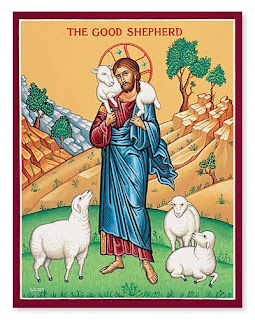I first encountered the following quote from Evelyn Underhill when I attended "DOXOLOGY: The Gathering" back in January 2009. What a tremendous picture it is for refocusing a pastor's attention on his proper vocation! I've also used it to teach my congregation what a pastor's job really is, and the most recent attempt at this came in this past Sunday's homily for "Good Shepherd Sunday," a.k.a. the Third Sunday of Easter. For all of my brothers in office, may these words and this image help you, as it has helped me, to "transcend mere dogginess."
 Now those sheep-dogs that afternoon gave me a much better address on the way in which pastoral work among souls should be done that I shall be able to give you. They were helping the shepherd to deal with a lot of very active sheep and lambs, to persuade them into the right pastures, to keep them from rushing down the wrong paths. And how did the successful dog do it? Not by barking, fuss, ostentatious authority, any kind of busy behaviour. The best dog that I saw never barked once; and he spent an astonishing amount of his time sitting perfectly still, looking at the shepherd. The communion of spirit between them was perfect. They worked as a unit. Neither of them seemed anxious or in a hurry. Neither was committed to a rigid plan; they were always content to wait. That dog was the docile and faithful agent of another mind. He used his whole intelligence and initiative, but always in obedience to his master’s directive will; and was ever prompt at self-effacement. The little mountain sheep he had to deal with were amazingly tiresome, as expert in doubling and twisting and going the wrong way as any naughty little boy. The dog went steadily on with it; and his tail never ceased to wag.
Now those sheep-dogs that afternoon gave me a much better address on the way in which pastoral work among souls should be done that I shall be able to give you. They were helping the shepherd to deal with a lot of very active sheep and lambs, to persuade them into the right pastures, to keep them from rushing down the wrong paths. And how did the successful dog do it? Not by barking, fuss, ostentatious authority, any kind of busy behaviour. The best dog that I saw never barked once; and he spent an astonishing amount of his time sitting perfectly still, looking at the shepherd. The communion of spirit between them was perfect. They worked as a unit. Neither of them seemed anxious or in a hurry. Neither was committed to a rigid plan; they were always content to wait. That dog was the docile and faithful agent of another mind. He used his whole intelligence and initiative, but always in obedience to his master’s directive will; and was ever prompt at self-effacement. The little mountain sheep he had to deal with were amazingly tiresome, as expert in doubling and twisting and going the wrong way as any naughty little boy. The dog went steadily on with it; and his tail never ceased to wag.
 What did that mean? It meant that his relation to the shepherd was the centre of his life; and because of that, he enjoyed doing his job with the sheep, he did not bother about the trouble, nor get discouraged with the apparent results. The dog had transcended mere dogginess. His actions were dictated by something right beyond himself. He was the agent of the shepherd, working for a scheme which was not his own and the whole of which he could not grasp; and it was just that which was the source of the delightedness, the eagerness, and also the discipline with which he worked. But he would not have kept that peculiar and intimate relation unless he had sat down and looked at the shepherd a great deal.
What did that mean? It meant that his relation to the shepherd was the centre of his life; and because of that, he enjoyed doing his job with the sheep, he did not bother about the trouble, nor get discouraged with the apparent results. The dog had transcended mere dogginess. His actions were dictated by something right beyond himself. He was the agent of the shepherd, working for a scheme which was not his own and the whole of which he could not grasp; and it was just that which was the source of the delightedness, the eagerness, and also the discipline with which he worked. But he would not have kept that peculiar and intimate relation unless he had sat down and looked at the shepherd a great deal.
[Evelyn Underhill, “The Teacher’s Vocation,” Collected Papers of Evelyn Underhill, Lucy Menzies, ed. (New York: Longmans, Green and Co., Inc., 1946), pp. 182-183.]
Good to see you back in blog action:) I've missed my fellow sheep-dog!
ReplyDeleteThanks, fellow sheep dog ... er, I mean, Paul. :-)
ReplyDelete